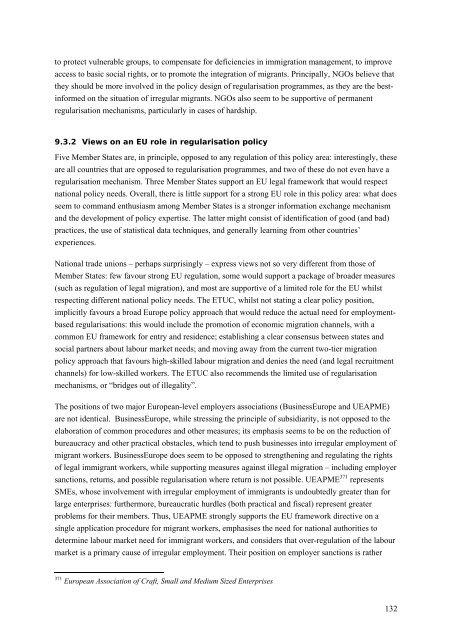REGINE Regularisations in Europe Final Report - European ...
REGINE Regularisations in Europe Final Report - European ...
REGINE Regularisations in Europe Final Report - European ...
You also want an ePaper? Increase the reach of your titles
YUMPU automatically turns print PDFs into web optimized ePapers that Google loves.
to protect vulnerable groups, to compensate for deficiencies <strong>in</strong> immigration management, to improve<br />
access to basic social rights, or to promote the <strong>in</strong>tegration of migrants. Pr<strong>in</strong>cipally, NGOs believe that<br />
they should be more <strong>in</strong>volved <strong>in</strong> the policy design of regularisation programmes, as they are the best<strong>in</strong>formed<br />
on the situation of irregular migrants. NGOs also seem to be supportive of permanent<br />
regularisation mechanisms, particularly <strong>in</strong> cases of hardship.<br />
9.3.2 Views on an EU role <strong>in</strong> regularisation policy<br />
Five Member States are, <strong>in</strong> pr<strong>in</strong>ciple, opposed to any regulation of this policy area: <strong>in</strong>terest<strong>in</strong>gly, these<br />
are all countries that are opposed to regularisation programmes, and two of these do not even have a<br />
regularisation mechanism. Three Member States support an EU legal framework that would respect<br />
national policy needs. Overall, there is little support for a strong EU role <strong>in</strong> this policy area: what does<br />
seem to command enthusiasm among Member States is a stronger <strong>in</strong>formation exchange mechanism<br />
and the development of policy expertise. The latter might consist of identification of good (and bad)<br />
practices, the use of statistical data techniques, and generally learn<strong>in</strong>g from other countries’<br />
experiences.<br />
National trade unions – perhaps surpris<strong>in</strong>gly – express views not so very different from those of<br />
Member States: few favour strong EU regulation, some would support a package of broader measures<br />
(such as regulation of legal migration), and most are supportive of a limited role for the EU whilst<br />
respect<strong>in</strong>g different national policy needs. The ETUC, whilst not stat<strong>in</strong>g a clear policy position,<br />
implicitly favours a broad <strong>Europe</strong> policy approach that would reduce the actual need for employmentbased<br />
regularisations: this would <strong>in</strong>clude the promotion of economic migration channels, with a<br />
common EU framework for entry and residence; establish<strong>in</strong>g a clear consensus between states and<br />
social partners about labour market needs; and mov<strong>in</strong>g away from the current two-tier migration<br />
policy approach that favours high-skilled labour migration and denies the need (and legal recruitment<br />
channels) for low-skilled workers. The ETUC also recommends the limited use of regularisation<br />
mechanisms, or “bridges out of illegality”.<br />
The positions of two major <strong>Europe</strong>an-level employers associations (Bus<strong>in</strong>ess<strong>Europe</strong> and UEAPME)<br />
are not identical. Bus<strong>in</strong>ess<strong>Europe</strong>, while stress<strong>in</strong>g the pr<strong>in</strong>ciple of subsidiarity, is not opposed to the<br />
elaboration of common procedures and other measures; its emphasis seems to be on the reduction of<br />
bureaucracy and other practical obstacles, which tend to push bus<strong>in</strong>esses <strong>in</strong>to irregular employment of<br />
migrant workers. Bus<strong>in</strong>ess<strong>Europe</strong> does seem to be opposed to strengthen<strong>in</strong>g and regulat<strong>in</strong>g the rights<br />
of legal immigrant workers, while support<strong>in</strong>g measures aga<strong>in</strong>st illegal migration – <strong>in</strong>clud<strong>in</strong>g employer<br />
sanctions, returns, and possible regularisation where return is not possible. UEAPME 371 represents<br />
SMEs, whose <strong>in</strong>volvement with irregular employment of immigrants is undoubtedly greater than for<br />
large enterprises: furthermore, bureaucratic hurdles (both practical and fiscal) represent greater<br />
problems for their members. Thus, UEAPME strongly supports the EU framework directive on a<br />
s<strong>in</strong>gle application procedure for migrant workers, emphasises the need for national authorities to<br />
determ<strong>in</strong>e labour market need for immigrant workers, and considers that over-regulation of the labour<br />
market is a primary cause of irregular employment. Their position on employer sanctions is rather<br />
371 <strong>Europe</strong>an Association of Craft, Small and Medium Sized Enterprises<br />
132
















